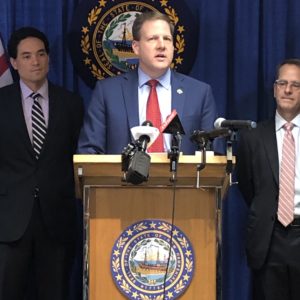Fear of coronavirus has reached such a level in the Live Free or Die State that Republican Gov. Chris Sununu has ordered all public schools closed for three weeks, a move that runs counter to the state’s long-cherished tradition of local control.
“I am directing all schools in New Hampshire to transition to a remote learning environment — effective immediately,” Sununu said at a rare Sunday press conference. “This directive will remain in place for three weeks through April 3rd and following that, we will assess the situation on the ground.
“So to be clear, while students will not be in schools, they will be learning and education in New Hampshire will go on,” he said.
Sununu was joined by several officials from his administration, including Department of Health and Human Services Commissioner Lori Shibinette, state epidemiologist Benjamin Chan and Department of Education Commissioner Frank Edelblut.
Such a sweeping edict from Concord conflicts with local control of town government, particularly local schools. More than 140 communities just held their annual town meetings last week, where citizens gathered to debate and decide issues ranging from setting the town budget, hiring a school resource officer, or buying a new dump truck.
Local communities have jealously guarded against state interference. The fact that Sununu’s actions have largely been accepted without complaint is a sign of just how frightened Granite Staters are by the COVID-19 outbreak. As of Sunday, the state had reported 13 confirmed cases, all of them related to travel, and limited to three of New Hampshire’s 10 counties. There have been no cases of community transmission as of Sunday’s announcement, though state officials expect that to change.
Dr. Chan also urged citizens to avoid large gatherings and any non-essential international travel and to follow the guidelines of the Centers for Disease Control. “It’s our collective responsibility to help slow the spread of COVID-19 in New Hampshire and across the United States.”
Interestingly, the CDC’s guidelines do not call for the widespread closing of public schools seen in New Hampshire and elsewhere. In fact, the CDC doesn’t even call for mass school closings if there is a COVID-19 exposure in a school, instead recommending a
“short building dismissal (2-5 days) to Clean/Disinfect/Contact Trace.” In cases like New Hampshire, with no school exposure and no known community spread, they recommend diligence, monitoring and putting an emphasis on improved hygiene.
“There may be some impact of much longer closures (8 weeks to 20 weeks) further into community spread, but that modeling also shows that other mitigation efforts (e.g., hand washing, home isolation) have more impact on both spread of disease and health care measures,” the CDC says in a report.
When asked by NHJournal, Sununu acknowledged that his administration was acting outside CDC guidelines, but argued that New Hampshire is uniquely able to take the proactive step of remote learning and, therefore, shutting down public schools makes sense.
“We wouldn’t be taking this step if we weren’t so prepared. I’ve talked to governors in other states and, frankly, they’re trying to get up to speed to where we are. We have so many districts that are already prepared [for remote learning]. It’s an amazing opportunity that we have, which makes the decision to do this for the next three weeks much easier.”
As for the CDC guidance, “They’re looking at it from a national perspective. My job is to look at the 603,” Sununu said.
At the same time, it appears Sununu and his team are looking at local politics as well. Edelblut, whose small-government philosophy and aggressive advocacy for local control and homeschooling make him an unusual ally, told NHJournal that many local pols are happy the state stepped in.
“In many cases, local school officials were receiving a lot of pressure from their communities to do something. And we want to be able to support our local officials in making those decisions. So I think you can do this as a support measure as well for local control by supporting our local school leaders.”
Of course, school boards could have made this decision without the governor’s actions, as many had done already (Bedford, Manchester and Nashua to name a few.) It’s easy to imagine panicky parents calling their local superintendent and angrily demanding schools be shut down, while others warn of the hardships they would face if schools are closed.
Politically speaking, Sununu did local officials a favor by letting them pass the buck. And scared parents, particularly affluent suburban moms with plenty of childcare options, are certain to cheer his decision. But from a public policy standpoint, is closing schools the right move?
Dr. Jennifer Nuzzo of the Johns Hopkins Center for Health Security notes that Singapore has been fairly successful in reducing its case numbers without closing schools. “I do worry calls to close schools come from parents who can easily absorb the impact,” she says, and points out that one of the unintended consequences is higher workplace absenteeism– particularly among health care workers when they are needed most.
NHJournal asked Sununu what his message was for healthcare workers with young children at home and big caseloads in New Hampshire’s hospitals, finding out he just shut down their schools?
“We’re providing a lot of flexibility. We’ve actually heard from hospitals that have asked, ‘Hey, can we set up a temporary childcare or daycare center within our facility so those workers can be at work?’ And that’s exactly the type of flexibility we’re going to give them.
“That’s one of the reasons we can take this initiative, whereas in other states it would be more problematic. We’re ahead of the ballgame here,” Sununu said.

